Make a Difference with Meatless Monday
How to make a difference? Eat Less Meat
Climate change seems overwhelming and beyond our control. 2017 brought hurricanes Harvey, Irma and Maria, earthquakes in Mexico, raging wild fires in Oregon, Minnesota and California, flooding southeast Asia drowning thousands of people. What will 2018 bring?
Last year proved that we cannot wait for government or politicians to address climate change. The good news is that we can take individual action. Eating less meat is a way to do something about climate change. Even if only once a week. Joining the global Meatless Monday global campaign makes a difference.
Consumption of meat and dairy is a major driver of climate change. Changing global demand for meat and dairy can improve our planet’s health.
[su_expanding_quote_web alignment=”full” source_site=”Natural Resources Defense Council” source_url=”https://www.nrdc.org/experts/sasha-stashwick/tackling-climate-change-through-diet-change” full_quote=”The meat we eat comes with a heavy environmental footprint. In particular, red meat from ruminant animals, like cows, sheep and goats, is actually a major driver of climate pollution. Raising these animals requires a lot of pastureland and a lot of grain production—often on land that might otherwise be forested soaking up carbon from the air. Working on a global scale to replace some meat with other foods will be critical to achieving our climate change goals. A shift towards healthier patterns of meat-eating could bring a quarter of the emissions reductions the world needs to avoid the worst consequences of climate change.” short_quote=”The meat we eat comes with a heavy environmental footprint.”]Imagine if all 340 million people in the US were part of the Meatless Monday global movement? Giving up meat one day a week would make a significant difference. NRDC estimates that if every American eliminated just a 1/4 pound serving of beef per week, greenhouse gas emissions would be reduced to the equivalent to taking 4–6 million cars off the road.
[su_expanding_quote_web alignment=”full” source_site=”Chatham House” source_url=”http://www.chathamhouse.org/expert/comment/16379″ full_quote=”The livestock sector is responsible for nearly 15 per cent of global emissions—similar to that produced by powering all the cars, trucks, planes, trains and ships in the world. Livestock production is also the largest source of two of the most potent greenhouse gases: methane and nitrous oxide. Methane results from digestion in ruminant animals such as cows, sheep and goats. Nitrous oxide is produced from manure and from fertilizers used to grow feed crops. Large amounts of carbon dioxide are also produced as forests are converted for pasture or to grow feed crops.” short_quote=”The livestock sector is responsible for nearly 15 per cent of global emissions—similar to that produced by powering all the cars, trucks, planes, trains and ships in the world.”]Not only is less meat better for the planet, it’s better for us as well. Eating less meat also leads to better health.
- Eating less meat and more plant foods (grains, fruits and vegetables, nuts and seeds) instead, reduces the risk of chronic disease.
http://www.meatlessmonday.com/images/photos/2016/09/meatless-monday-global-toolkit.pdf
- Meatless meals are more affordable
Meals that are built around vegetables, beans and grains tend to be cheaper than meals built around meat. It can be challenging to serve healthy meals on a budget, going meatless once a week can save money for the purchase of more of fruits and vegetables.
- Meatless meals increase food security
If current crop production used for animal feed and other nonfood uses (including biofuels) were targeted for direct consumption, some 70 percent more calories would become available, potentially providing enough calories to meet the basic needs of an additional 4 billion people, reducing world humber.
It can take up to 12 kg of grain to produce 1 kg of beef. Some 800 million people on the planet suffer from hunger or malnutrition, yet an amount of cereal that could feed three times this number of people is fed to cattle, pigs and chickens.
What to do?
Be part of climate change solution by
- Reducing demand for animal-based food products. I alternate vegetarian and non-vegetarian days
- Increasing plant-based foods in our regular diets. Ethnic foods are a marvelous way to enjoy delicious meatless meals: curry, Indian dahl, Moroccan chickpea tagine
- Replacing ecologically-inefficient ruminants (cattle, goats, sheep) with poultry, and fish. I plan our meals to have fish once or twice a week and poultry (chicken or turkey once a week.
- When we do eat beef, I always try to buy grass-fed beef. Another great option is bison, which I can get at our local Farmer’s Market.
“Consumers can also reduce the carbon footprint—and other environmental and health impacts—of their beef by buying meat that’s been certified as having been produced on well-managed ranches and farms.”
Recipes
Moroccan Tagine with Chicken and Garbanzo
Pasta with White Beans, Pesto and Sun-dried Tomatoes
Orzo with Garbanzo Beans, Goat Cheese and Basil
For More Empowerment
Animal Agriculture is Chocking the Earth and Making Us Sick. We Must Act Now.
How Reduced Meat Consumption Could Save $31 Trillion – and The Planet
Raising Beef Uses Ten Times More Resources Than Poultry, Dairy, Eggs or Pork

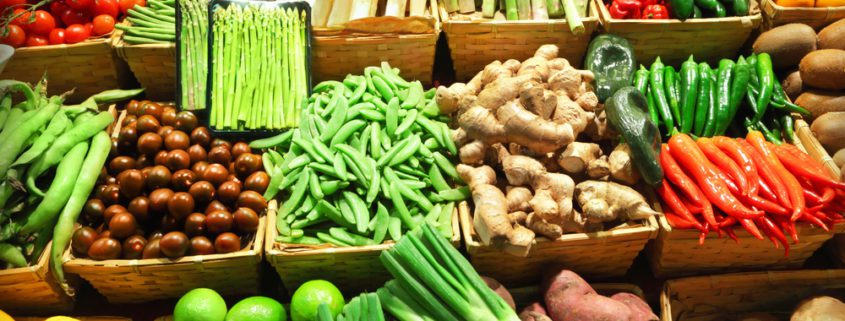
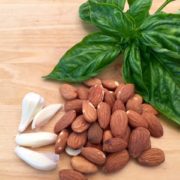
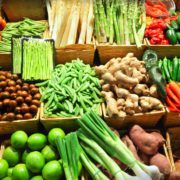
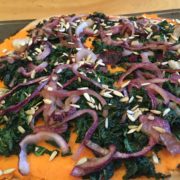
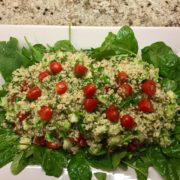


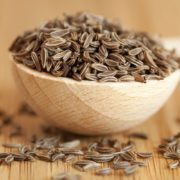

Leave a Reply
Want to join the discussion?Feel free to contribute!